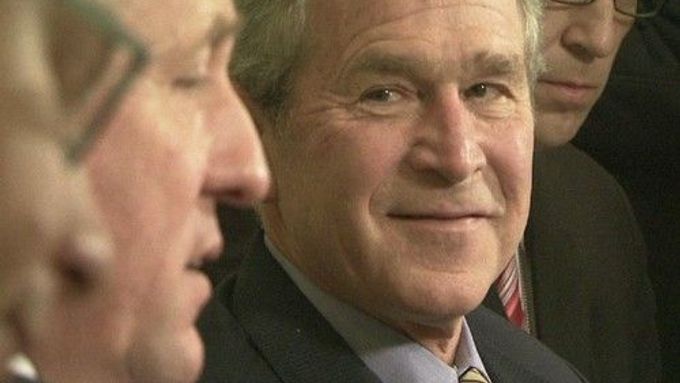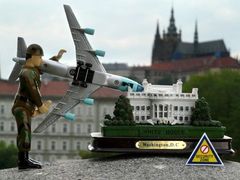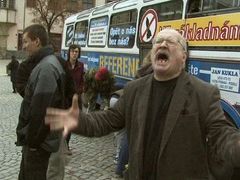Prague - For more than a year now, the authors of the documentary film Czech Dream, Vít Klusák and Filip Remunda, have been filming a new document, Czech Peace.
The film depicts the Czech disputes over the planned US radar, including PM Mirek Topolánek's trip to America and his meeting with George Bush. It will reach the cinemas in the spring. Aktuálně.cz interviewed the authors to learn more.
Is it true that Topolánek flew to the US with a shotgun as a gift for Bush?
When Mr Topolánek was to fly to visit Mr Bush and take that gift rifle with him, we were properly accredited and were supposed to fly with PM Topolánek in his governmental plane. Then someone at the press department realised we were difficult to control - we were not accountable to any editor, publisher or director…
They first dropped our sound technician, saying they can't fit him. Then they dropped Filip and, a day before the departure, Vít - allegedly to make space for the transport minister. According to witnesses, the plane then left for Washington half-empty. And we had no other option than chase the delegation by a regular flight. That was very unfortunate because PM Topolánek allegedly played with that shotgun during the flight, "shooting" stewardesses and journalists. That would have fit the film well.
Read more: Just how tough were the US-Czech radar talks?
But finally you got all the way to the White House and to the Bush-Topolánek meeting. What was your face-to-face impression of the president?
We found out, for example, that George Bush doesn't like small cameras. After a complicated security check, a press secretary started to examine the equipment with which we would film or photograph the president. She uncompromisingly barred all small digital cameras and only admitted SLRs. Bush thinks the image quality with small cameras is not good enough for the White House.
Who else appears in the film?
Ivan Martin Jirous [well-known dissident], George W. Bush, Dáša Vokatá with a guitar, activists of the No to Bases group, American combat toys, drunk journalists at a NATO summit, activists of the We Don't Want Radars - We Want Rockets group, arms industry lobbyists, [Defence Minister] Vlasta Parkanová and Jan Vyčítal, military police who twisted our arms while arresting us, two homosexual skinheads who sang the Czech anthem while hugging each other, Václav Klaus, Václav Havel, and the tamed wild boar Jonáš. And some others.
Czech Peace is to be a comedy about Czech cowardice and courage, and about the Czech conception of war and peace. What is most comical about the radar tug-of-war?
We want to consider serious topics with humour and an open mind. If something is laughable, it incites us to thinking. We laugh when pro-radar activist Jan Šinágl deprecates the legacy of The Good Soldier Švejk at a conference on [novelist Jaroslav] Hašek and argues, with a US flag in his hand, that we must defend democracy with our own blood. We laugh when a Foreign Ministry official reveals that the radar is obviously aimed against Russia, but the minister is never allowed to say that openly. Another funny point is that Alexandr Vondra is allegedly a paid KGB agent…
Read more: West cheats and beats us in PR, says Russian insider
A song in your film goes: "Hush, Mr Bush, go to hell, Yankee go home." Does this express your stance on the planned radar deployment on Czech soil?
It would be good to explain how a radar generally works: It sends a huge amount of energy in a certain direction, a part of which reflects back to the radar, which then assesses what the object was. If we take this as a metaphor, then we've already had the radar here for a long time: The radar disputes have illuminated the Czech society and each of us has reflected the radar beams in a different way - a lot of people protest, others excitedly welcome the radar, scientists and activists weigh in, and a solid number of musicians have used the issue as an inspiration.
We now have at least 10 songs about the radar, starting from "Hey you cunt in the White House" all the way to "Welcome, radar of Stars & Stripes" and "Radar read backwards is also radar". A sensitive viewer will figure out which of the songs is closest to our hearts.
Are Czechs more threatened by Russians, or by Americans? Do you side with the radar supporters, or opponents? Or are you striving for an impartial perspective?
We are most threatened by fear. Those who are afraid are the easiest to manipulate. During the Cold War the media scared us with a war threat coming from the West; after 9/11 they scared us with Islamists, and now it seems to be Russia's turn. Slovenian philosopher Slavoj Žižek told an anti-radar rally in Prague that the Czech Republic, like Slovenia, has no chance to be economically independent, but politically both countries should try to fight attempts by larger powers to control them.
Read more: US and ČR sign missile defense treaty in Prague
We are not shooting the film to support someone, but because we ourselves don't know where the truth lies. The filming is giving us an opportunity to meet supporters of completely contrasting views and people with dissimilar life experience, including politicians and intellectuals. We support critical thinking and we laugh at demagogical phrases used by both the supporters and opponents.
Are you then more interested in the radar dispute itself, or rather in what the dispute says about the Czech Republic and Czechs?
We are interested in the 19-year period following after the Velvet Revolution and the way that superpowers are again fighting over us. We are interested in a place hidden deep in a forest where Soviet troops are to be replaced by Americans.
We are interested in people who in a relatively stable democracy felt and urge to rally in the streets again, this time for or, more prominently, against the presence of US soldiers in Bohemia. We are interested in whether it is possible at all to find who's right. Does an ordinary citizen carefully reading the newspapers have any chance at all to figure out whether the radar should be here, or not?
The film will show what this all means. And it will also show to us, since we are not using the film to illustrate a premeditated thesis, but to explore. We are making documentaries in order to find out, not to persuade someone about something.


